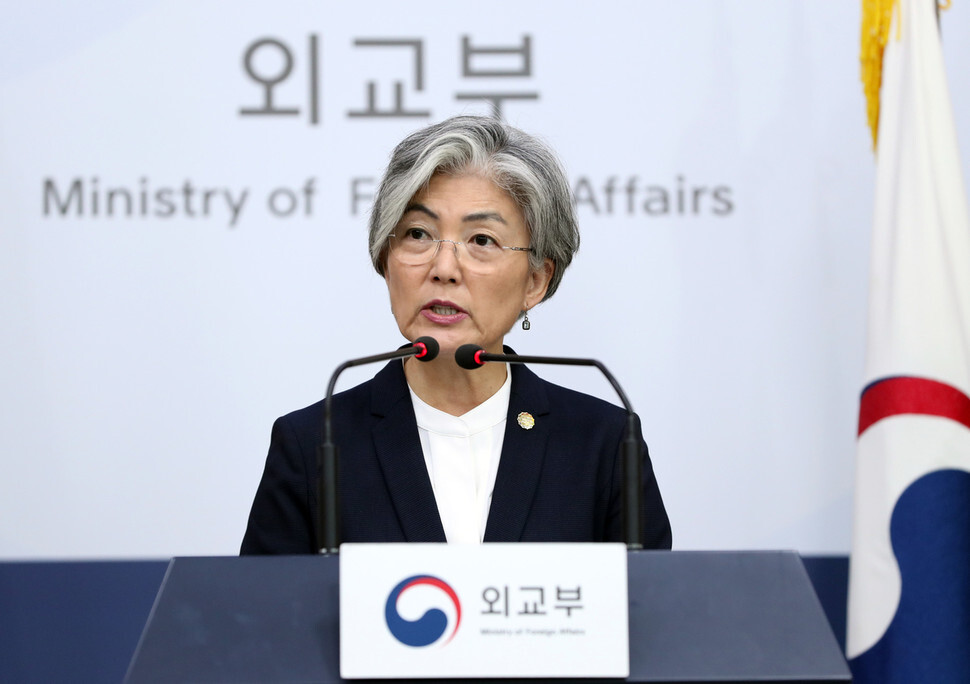hankyoreh
Links to other country sites 다른 나라 사이트 링크
Kang Kyung-wha says S. Korea, Japan have been discussing solutions for forced labor issue

Following South Korean Prime Minister Lee Nak-yeon’s delivery of a letter to Japanese Prime Minister Shinzo Abe from South Korean President Moon Jae-in and the two prime ministers’ agreement that bilateral relations “cannot be left in their current difficult state,” South Korean Minister of Foreign Affairs Kang Kyung-wha announced that both sides have been discussing different potential solutions on the forced labor issue, which has been the key point of contention in their conflict.
“The distance has been bridged in some respects, but the gap certainly remains quite large,” she said.
Speaking to the South Korean press at the Ministry of Foreign Affairs in Seoul on Oct. 24, Kang commented on the situation with discussions between South Korea and Japan on resolving the forced labor mobilization issue.
“Last June, we proposed a ‘1+1 approach’ [involving a fund with voluntary contributions from South Korea and Japanese companies], and since then we have indicated that this is not our fixed position and proposed using it as a basis for discussions,” she explained.
“Discussion is moving forward at different levels between [South Korean and Japanese authorities] in consideration of different elements, including this [1+1 plan],” she added.
“We are approaching discussions under our principled position that the judicial process must be seen all the way through,” she said.
A solution based on communication with forced labor survivors
While Kang did not share the specifics of the discussions, analysts are speculating that they have focused on different ideas including having South Korean and Japanese companies and the South Korean government play separate roles on those issues where final Supreme Court rulings have been made and those where they have not. Also noteworthy is the South Korean government’s formalization of the discussions on resolving the forced labor conscription issue that have taken place behind the scenes to date.
“These are ideas for producing a solution based on communication with the forced labor conscription survivors, rather than the two governments suddenly announcing the results of behind-the-scenes discussions like they did with the South Korean and Japanese governments’ comfort women agreement in 2015,” said Kim Sook-hyun, director of the external strategy research office at the Institute for National Security Strategy (INSS).
With the end of the two sides’ General Security of Military Information Agreement (GSOMIA) looming on Nov. 23, Kang explained, “The GSOMIA issue was touched off by Japan’s unjust export controls, and the Japanese export control measures will need to be rescinded for a favorable climate to take place to allow for a re-examination [of GSOMIA].”
“I don’t see the GSOMIA decision itself as a matter for in-depth discussions with Japan at the present time,” she added.
Regarding negotiations for the 11th South Korea-US Special Measures Agreement (SMA) on defense cost-sharing in Honolulu on Oct. 22-24, Kang said, “The US is definitely demanding a much higher level than in the past.”
“The basic position [of the South Korean government] is that there needs to be a rational sharing of costs within the SMA framework that has been sustained over 10 rounds to date,” she said.
By Noh Ji-won and Park Min-hee, staff reporters
Please direct comments or questions to [english@hani.co.kr]

Editorial・opinion
![[Editorial] Yoon must halt procurement of SM-3 interceptor missiles [Editorial] Yoon must halt procurement of SM-3 interceptor missiles](https://flexible.img.hani.co.kr/flexible/normal/500/300/imgdb/child/2024/0501/17145495551605_1717145495195344.jpg) [Editorial] Yoon must halt procurement of SM-3 interceptor missiles
[Editorial] Yoon must halt procurement of SM-3 interceptor missiles![[Guest essay] Maybe Korea’s rapid population decline is an opportunity, not a crisis [Guest essay] Maybe Korea’s rapid population decline is an opportunity, not a crisis](https://flexible.img.hani.co.kr/flexible/normal/500/300/imgdb/original/2024/0430/9417144634983596.jpg) [Guest essay] Maybe Korea’s rapid population decline is an opportunity, not a crisis
[Guest essay] Maybe Korea’s rapid population decline is an opportunity, not a crisis- [Column] Can Yoon steer diplomacy with Russia, China back on track?
- [Column] Season 2 of special prosecutor probe may be coming to Korea soon
- [Column] Park Geun-hye déjà vu in Yoon Suk-yeol
- [Editorial] New weight of N. Korea’s nuclear threats makes dialogue all the more urgent
- [Guest essay] The real reason Korea’s new right wants to dub Rhee a founding father
- [Column] ‘Choson’: Is it time we start referring to N. Korea in its own terms?
- [Editorial] Japan’s rewriting of history with Korea has gone too far
- [Column] The president’s questionable capacity for dialogue
Most viewed articles
- 1Months and months of overdue wages are pushing migrant workers in Korea into debt
- 2[Editorial] Yoon must halt procurement of SM-3 interceptor missiles
- 3Trump asks why US would defend Korea, hints at hiking Seoul’s defense cost burden
- 4[Guest essay] Maybe Korea’s rapid population decline is an opportunity, not a crisis
- 5At heart of West’s handwringing over Chinese ‘overcapacity,’ a battle to lead key future industries
- 61 in 3 S. Korean security experts support nuclear armament, CSIS finds
- 7Fruitless Yoon-Lee summit inflames partisan tensions in Korea
- 8First meeting between Yoon, Lee in 2 years ends without compromise or agreement
- 9[Column] Park Geun-hye déjà vu in Yoon Suk-yeol
- 10South Korea officially an aged society just 17 years after becoming aging society